As coronavirus spreads in Lagos State, many people are stockpiling essentials for what they believe will be periods of home confinement and panicked shoppers have stripped many Lagos markets of staples ranging from rice, beans, garri, to meat among others
As a matter of fact, the virus currently poses a serious threat to the integrity of food supply in Lagos State. It is panic-buying itself that is causing the real disruption, Consumers Assembly has learnt.
Experts interviewed by Consumers Assembly said that while food supply chain is generally fine at this point, rapid, dramatic shifts in consumer behavior have temporarily disrupted the market.
Is it safe – and ethical – to order food online during the coronavirus outbreak? In America for instance, Donald John
Trump himself has sought to assuage fears by urging the country not to hoard groceries amid the outbreak, saying he had a call with grocery industry leaders who urged him to speak out against hoarding.
They have actually asked me to say: ‘Could you buy a little bit less, please?’ I thought I’d never hear that from a retailer,” Trump remarked, also saying: “They have no shortages. We have no shortages other than people buying anywhere from three to five times more.”
Deno Edwards, the head of consumer intelligent unit (CIU), a department of Consumers Assembly said that, a widespread shift to stay at home mandates played a role. Because people will be staying at home, they would have to eat at home. Some companies provided meals to their employees. More than 50% of food expenditures were consumed away from home, Dino noted.
Now, all those people will be staying at home and most of them are making food at home, instead of going out.” He said that, “Overnight, the channels whereby people are getting food are just completely changing.”
Charles Danson, Director of Urban Kitchen said that recently hard-to-come-by staples are still around. The present distribution model isn’t aligned with the new buying behavior. People are buying more staples, but they’re not actually using more – what he described as “phantom demand”.









